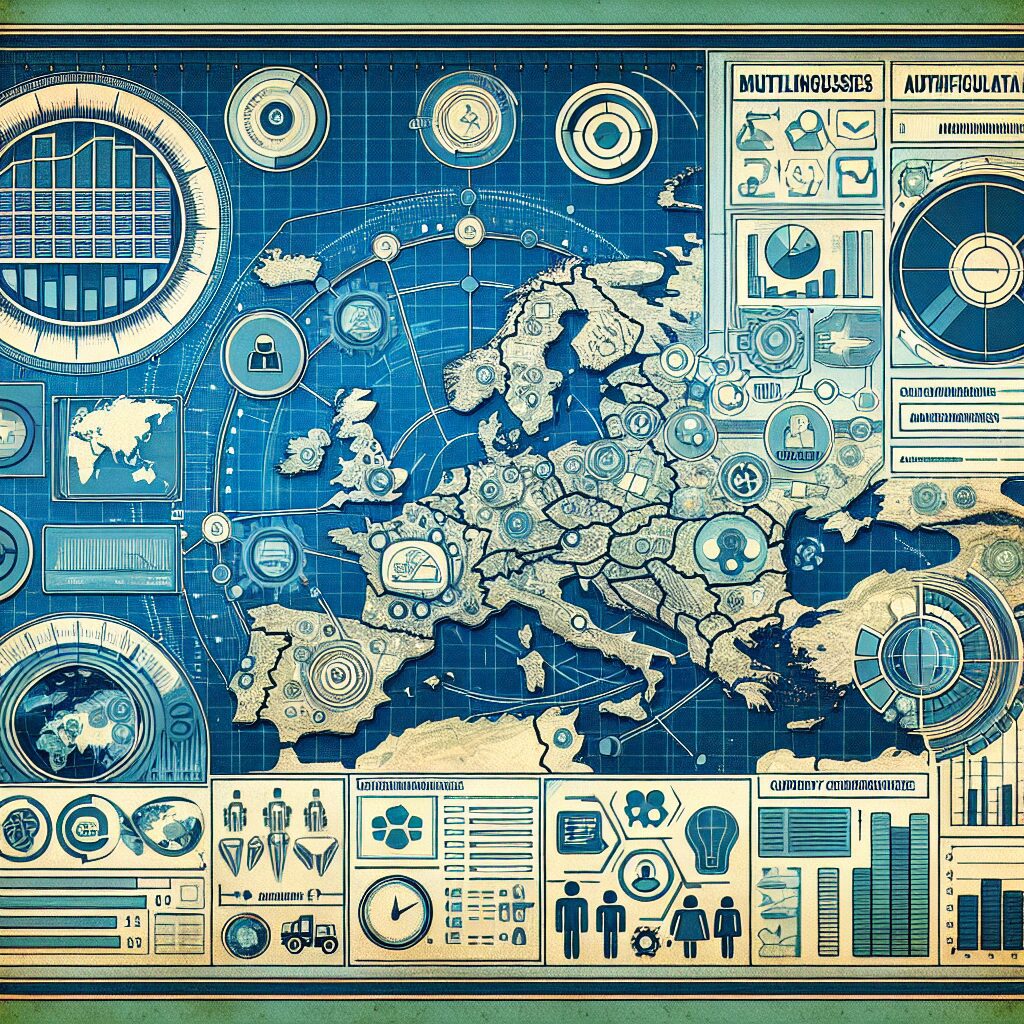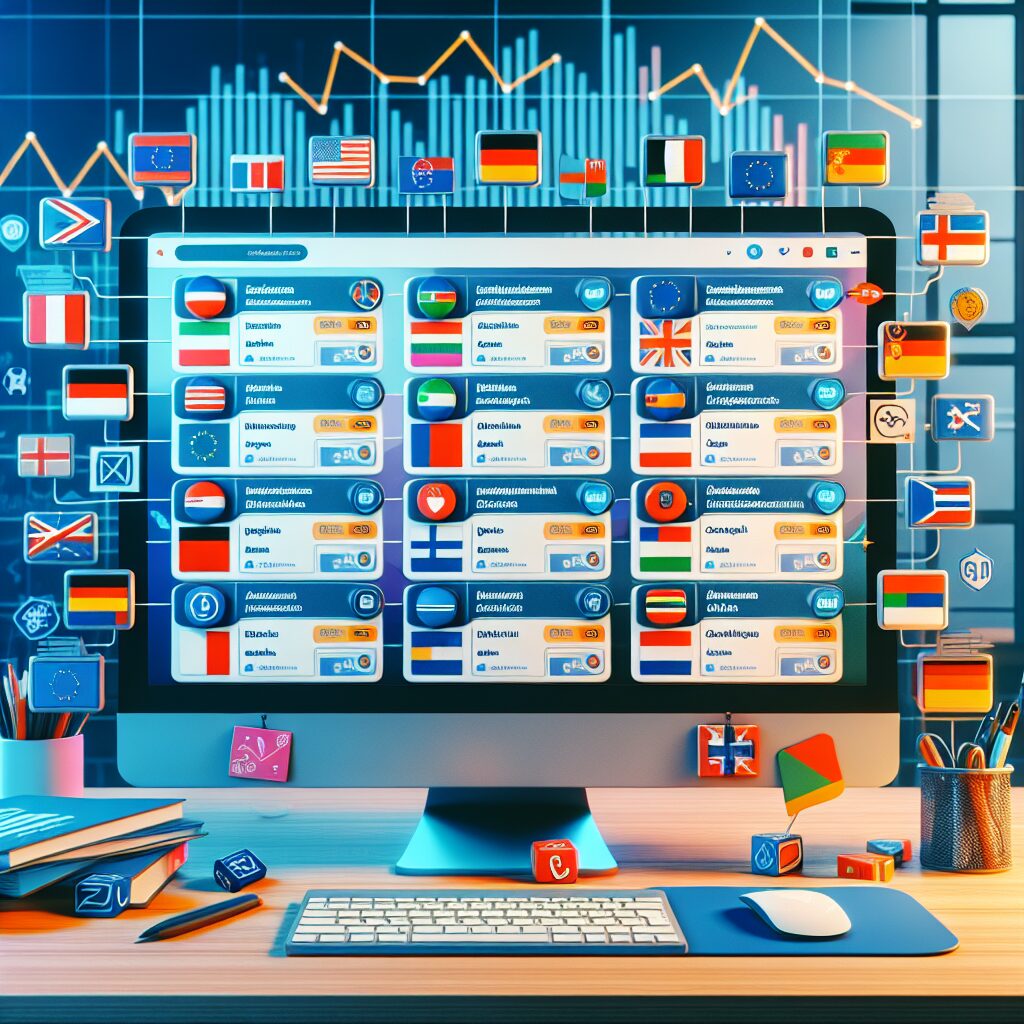About eldris
At Eldris, we automate SEO, multilingual site expansion, and EU compliance for brands scaling across Europe. Our AI-powered platform handles everything from content publishing to regulatory docs—so you don’t have to.
In This Article
- SEO automation empowers European enterprises to manage multilingual, regulatory-heavy environments effectively.
- Key features to prioritise include AI capabilities, GDPR compliance, integration and scalability.
- Top tools such as Semrush, Sistrix, and Ryte offer distinct advantages based on enterprise needs.
- Focus on workflow adaptability, data integrity, and language support when making your selection.
- Future-proof your SEO strategy by choosing platforms with smart modules, strong support and clear roadmaps.
Why SEO Automation Matters in a European Context
Digital complexity and multilingual scale
SEO automation plays a pivotal role in modern digital strategies, particularly across Europe where linguistic diversity and national regulations complicate execution. In such a fragmented digital market, enterprises are under pressure to maintain optimal search engine visibility across multiple countries, each with distinct language, consumer behaviour, and SERP algorithms. Deploying manual processes for keyword analysis, competitor benchmarking, content optimisation, and technical audits becomes not just inefficient—but nearly impossible at scale.
This is where seo automation becomes indispensable. By leveraging advanced tools that streamline time-consuming SEO tasks, companies can maintain consistency, reduce human error, and improve time-to-market for optimised content across various regional websites. Automation ensures that localisation is not compromised by scalability, giving enterprises the confidence to deploy multi-market strategies with agility.

Key Features to Evaluate in SEO Automation Platforms
What enterprise SEO buyers should look for
When comparing seo automation platforms across Europe, discerning SEO teams must align functional capabilities with strategic objectives. A robust platform should offer comprehensive on-page and off-page analysis tools, automated keyword tracking, backlink auditing, and technical SEO crawlers. Workflow management and collaboration platforms are also key for large organisations where several teams contribute to digital operations.
Look for platforms that offer intelligent recommendations through machine learning. These provide real-time suggestions for content improvements, internal linking strategies, and even schema markup opportunities. Additionally, platforms offering automated alerts for ranking fluctuations or technical errors can enable corrective action before it impacts traffic significantly. Integration with analytics and CRM platforms is also critical for comprehensive ROI tracking.
“An efficient SEO automation platform doesn’t just reduce manual labour—it amplifies strategic decision-making with real-time data and actionable insights.”
Top Platforms Popular in Europe Today
Several seo automation platforms have earned strong reputations in European markets. These include Semrush, Ahrefs, SE Ranking, Sistrix, and Ryte—each offering a distinct set of features tailored to enterprise needs.
Semrush remains a favourite for its comprehensive keyword database and in-depth competitor analysis. Its site audit tools and backlink monitoring modules are especially robust.
Ahrefs excels in backlink data and technical SEO support. Its interface is particularly suitable for power users and SEO professionals who prioritise data accuracy and depth.
Sistrix, a German-based SaaS, is uniquely positioned to address the nuances of EU-specific search behaviours and indexing patterns. It offers region-specific visibility indices and reporting modules ideal for pan-European campaigns.
Ryte focuses on website quality management and technical optimisation, placing a strong emphasis on compliance, which is increasingly valued in GDPR-focused industries like finance and healthcare.
SE Ranking offers an affordable yet powerful suite of tools suitable for growing enterprises looking to scale their SEO operations across language zones.
These platforms also provide varying degrees of automation, from daily keyword rank updates to content scoring engines and automatic backlink disavowal suggestions. When running comparisons, always map platform strengths to your specific technical and content-driven SEO requirements.
AI Capabilities and Smart Automation Modules
Artificial Intelligence fuels another layer of seo automation, helping platforms serve insights that previously required hours of manual analysis. Natural Language Processing (NLP) modules, for example, help content teams fine-tune readability, tone, and keyword placement. Predictive algorithms now power keyword discovery tools based on emerging search trends and audience segmentation data.
Platforms like SurferSEO and Clearscope integrate AI to provide content recommendations in real time by analysing top-ranking pages and suggesting ideal formats, word counts, and semantic keyword usage. Such intelligence enhances both the efficiency and precision of content generation.
Similarly, tools such as MarketMuse and Frase use AI-driven audit frameworks to assign content scores. Teams can prioritise pages based on machine-led content gap analysis, DNS health, or internal linking opportunities.
By incorporating AI, European businesses can enhance localisation efforts with automatically optimised meta descriptions, hierarchical markup, and even voice search readiness—all critical components for multi-device user engagement.
Compliance with GDPR and EU Data Laws
No seo automation discussion is complete without addressing compliance. European data laws, especially the General Data Protection Regulation (GDPR), impose strict rules on the collection, storage, and processing of user data. SEO platforms handling user analytics and behavioural data must ensure full transparency and regulatory alignment.
When selecting a platform, verify the location of its data servers. Platforms hosted within the EU, or those maintaining EU-compliant data processors, provide regulatory safeguards. Check whether they support cookie-less tracking or consent-based analytics scripts, crucial for remaining within legal reporting frameworks.
Platforms like Matomo and Ryte promote data ownership and host options in the EU. Always ensure the platform includes data anonymisation settings, opt-out features for end-users, and tools to handle data deletion requests seamlessly. Remember, automation should also enable compliance—not complicate it.
Independent enterprise SEO platform reviews
Handling Multilingual Content at Scale
Europe’s linguistic landscape requires platforms adept at managing multilingual content without compromising on SEO quality. Automation tools must support language-specific keyword research, meta tag creation, hreflang application, and local SERP monitoring.
Effective platforms will allow SEO teams to manage content workflows for multiple regions from a single interface. For example, DeepL integrations or API access for external translators can minimise duplication of labour and reduce localisation timeframes.
Moreover, platforms should permit segmentation of performance metrics by country and language. This helps enterprises track keyword performance, bounce rates, and CTRs for each language variant, making content refinement far more precise.
Learn more about SEO Automation and AI-Driven Optimisation
Custom Reporting, Dashboards, and KPIs
KPIs in SEO range from visibility indices and backlinks gained to CTR and revenue contribution. An integrated seo automation tool must enable teams to track these metrics via custom dashboards that update in real time. Automation ensures seamless reporting cycles and keeps stakeholders informed with minimal effort.
Dashboards should be configurable to suit various roles—from content managers and strategists to C-level executives. Many European companies are seeking solutions that deliver custom monthly reports, predictive analytics, and multi-channel attribution models. These streamline decision-making and highlight areas requiring budget reallocation.
Some platforms also allow white-labelling, which adds value when agencies serve multiple clients with distinct SEO goals and KPIs. Seamless export to Excel, Google Sheets, or client-facing portals is another added benefit in retaining transparency and improving accountability.
Integration with Enterprise Stack & APIs
SEO platforms do not exist in isolation. An efficient seo automation suite must integrate easily with other systems within the enterprise tech stack. Integration with CMSs like WordPress, HubSpot, and Sitecore, as well as analytics platforms such as Google Analytics, Adobe Analytics, or Matomo, is essential.
Furthermore, API access enables large organisations to push and pull data between internal tools, enterprise data lakes, and marketing software. For example, automated export of keyword ranking performance to a business intelligence platform can transform SEO data into meaningful enterprise insights.
<a href="Read a related article“>Explore how integration enhances ROI.
Platform Performance: Speed, Reliability, Updates
Speed and uptime are often overlooked but are critical when it comes to handling large datasets and real-time updates. An SEO platform should deliver rapid site crawl functionalities and data delivery without lags, ensuring your content decisions are based on the latest available information.
Look for vendors with transparent SLAs (Service Level Agreements), platform status pages, and a proven history of quick response to algorithm updates. Frequent enhancements also indicate an agile development team aligned with the shifting SEO landscape.
A strong customer support team enhances platform usability, particularly when onboarding or scaling usage across multi-country stakeholders. Also, pay attention to trial periods—these can be leveraged for compatibility testing before entering a contractual agreement.
Scalability Across Markets and Use Cases
For enterprises targeting multiple European markets, scalability becomes more than a checkbox feature—it’s a necessity. A scalable platform must adapt to new markets, additional users, increasing data volumes, and evolving objectives without performance loss.
Modern seo automation platforms support role-based access controls, user auditing, and region-specific rules. These features are critical for decentralised teams spanning different geographies. Whether you’re launching a campaign in Poland or localising Czech microsites, the platform should provide streamlined workflows for every market.
Look for platforms that offer modular add-ons—this allows businesses to evolve their feature set without migrating data or retraining entire departments. Such elasticity makes platform longevity and ROI much more attainable.
Automation tools for global SEO expansion
Conclusion: Choosing the Right Platform for Your Team
[CONCLUSION_CONTENT]
Great guide on compare-seo-automation-platforms-europe – Community Feedback
What features should I prioritise when comparing European SEO automation platforms?
Focus on multilingual support, automation capabilities, regulatory compliance, scalability, AI integration, reporting, and compatibility with your tech stack to ensure a seamless SEO workflow across markets.
How do SEO automation platforms differ for the European market?
European SEO automation platforms often offer enhanced multilingual capabilities, country-specific compliance, and integration options tailored to varied EU regulations and user behaviours.
Is automating SEO a safe choice for scaling brands in the EU?
Yes, when chosen carefully. Leading automation platforms ensure compliance, content quality, and efficiency, helping brands expand safely and consistently across diverse European markets.








